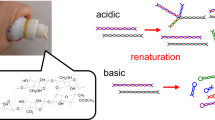Abstract
POLYPHLORETIN phosphate belongs to a group of enzyme inhibitors of relatively high molecular weight synthesized a few years ago1. By phosphorylation of phloretin—the aglucon of phlorizin—with phosphorus oxychloride under specific conditions a polymerization reaction occurred leading to a presumably cross-linked high-weight polymer.
This is a preview of subscription content, access via your institution
Access options
Subscribe to this journal
Receive 51 print issues and online access
$199.00 per year
only $3.90 per issue
Buy this article
- Purchase on Springer Link
- Instant access to full article PDF
Prices may be subject to local taxes which are calculated during checkout
Similar content being viewed by others
References
Diczfalusy, E., Fernö, O., Fex, H., Högberg, B., Linderot, T., and Rosenberg, T. H., Acta Chem. Scand., 7, 913 (1953).
Fries, B., Acta Chir. Scand., Supp., 217 (1956).
Fries, B., and Walinder, G., Acta Radiol., 48, 113 (1957).
Fries, B., Acta Chir. Scand. (in the press).
Birke, G., Fries, B., Liljedahl, S.-O., and Plantin, L. E. (unpublished).
Fåhreus, R., Acta Med. Scand., 55, 1 (1921).
Knisely, M. H., et al., Science, 106, 431 (1947).
Author information
Authors and Affiliations
Rights and permissions
About this article
Cite this article
FRIES, B. Effect of Polyphloretin Phosphate on the Suspension Stability of Red Blood Corpuscles. Nature 184, 62–63 (1959). https://doi.org/10.1038/184062a0
Issue Date:
DOI: https://doi.org/10.1038/184062a0
This article is cited by
-
Blockade by Polyphloretin Phosphate of the Prostaglandin F2α, Action on Isolated Human Bronchi
Nature New Biology (1971)
Comments
By submitting a comment you agree to abide by our Terms and Community Guidelines. If you find something abusive or that does not comply with our terms or guidelines please flag it as inappropriate.



